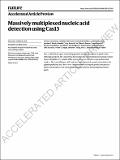Massively multiplexed nucleic acid detection using Cas13
Author(s)
Ackerman, Cheri M.; Myhrvold, Cameron; Thakku, Sri Gowtham; Freije, Catherine A.; Metsky, Hayden C.; Yang, David K.; Ye, Simon H.; Boehm, Chloe K.; Kosoko-Thoroddsen, Tinna-Sólveig F.; Kehe, Jared; Nguyen, Tien G.; Carter, Amber; Kulesa, Anthony; Barnes, John R.; Dugan, Vivien G.; Hung, Deborah T.; Blainey, Paul C.; Sabeti, Pardis C.; ... Show more Show less
Downloads41586-020-2279-8_reference.pdf (26.14Mb)
Publisher with Creative Commons License
Publisher with Creative Commons License
Creative Commons Attribution
Terms of use
Metadata
Show full item recordAbstract
The overwhelming majority of globally circulating pathogens go undetected, undermining patient care and hindering outbreak preparedness and response. To enable routine surveillance and comprehensive diagnostic applications, there is a need for detection technologies that can scale to test many samples while simultaneously testing for many pathogens. Here, we develop Combinatorial Arrayed Reactions for Multiplexed Evaluation of Nucleic acids (CARMEN), a platform for scalable, multiplexed pathogen detection. In the CARMEN platform, nanoliter droplets containing CRISPR-based nucleic acid detection reagents self-organize in a microwell array to pair with droplets of amplified samples, testing each sample against each CRISPR RNA (crRNA) in replicate. The combination of CARMEN and Cas13 detection (CARMEN-Cas13) enables robust testing of >4,500 crRNA-target pairs on a single array. Using CARMEN-Cas13, we developed a multiplexed assay that simultaneously differentiates all 169 human-associated viruses with ≥10 published genome sequences and rapidly incorporated an additional crRNA to detect the causative agent of the 2020 COVID-19 pandemic. CARMEN-Cas13 further enables comprehensive subtyping of influenza A strains and multiplexed identification of dozens of HIV drug-resistance mutations. CARMEN’s intrinsic multiplexing and throughput capabilities make it practical to scale, as miniaturization decreases reagent cost per test >300-fold. Scalable, highly-multiplexed CRISPR-based nucleic acid detection shifts diagnostic and surveillance efforts from targeted testing of high-priority samples to comprehensive testing of large sample sets, greatly benefiting patients and public health. ©2020
Date issued
2020-04Department
Broad Institute of MIT and Harvard; Massachusetts Institute of Technology. Department of Biological Engineering; Harvard University--MIT Division of Health Sciences and Technology; Massachusetts Institute of Technology. Department of Electrical Engineering and Computer ScienceJournal
Nature
Publisher
Springer Science and Business Media LLC
Citation
Ackerman, Cheri M., "Massively multiplexed nucleic acid detection using Cas13." Nature 2020 (Apr. 2020): doi 10.1038/s41586-020-2279-8 ©2020 Author(s)
Version: Author's final manuscript
ISSN
0028-0836
1476-4687
Keywords
Multidisciplinary